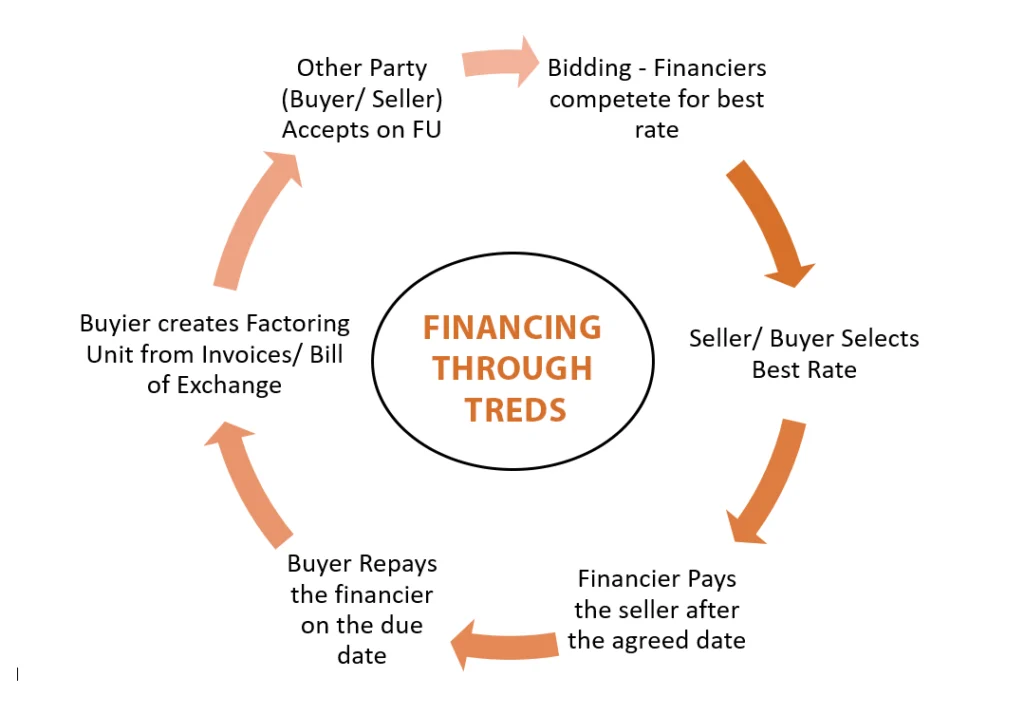TReDS, or the Trade Receivables Discounting System, is an initiative by the Reserve Bank of India (RBI) to help Micro, Small, and Medium Enterprises (MSMEs) get their payments faster from large corporations, government departments, and public sector units (PSUs).
Objective of TReDS
TReDS was created to address two main challenges faced by MSMEs:
- Quick payment realization: Ensuring they get their receivables on time.
- Eliminating credit risk: Reducing the risk of non-payment.
By bringing transparency to the business ecosystem, TReDS acts as a catalyst for MSME growth.
How Does TReDS Work?
The TReDS platform allows MSMEs to discount their invoices or Bills of Exchange with the help of financiers. This happens through an auction system, ensuring prompt payment at competitive rates.

Key Features:
- Factoring without recourse: MSMEs can sell their receivables without worrying about credit risk.
- Quick realization of payments: MSMEs get paid faster.
- Efficient price discovery: Competitive bidding ensures the best rates for MSMEs.
Who Can Participate on the TReDS Platform?
Three main entities participate in TReDS:
- MSME Suppliers: Businesses supplying goods or services as defined under the MSMED Act, 2006.
- Buyers: Corporates, government departments, PSUs, and others.
- Financiers: Banks, NBFCs (Non-Banking Financial Companies), and other financial institutions.
Who Can Start a TReDS Transaction?
- MSME Seller Initiates:
- When the seller uploads invoices and bears the interest cost, it’s called “Factoring” (Single Seller – Multiple Buyers).
- Buyer Initiates:
- When the buyer starts the transaction and bears the interest cost, it’s called “Reverse Factoring” (Single Buyer – Multiple Sellers).
Steps for Financing/Discounting Through TReDS
- Creation of a Factoring Unit (FU):
- FU refers to the invoices or Bills of Exchange submitted by the MSME or buyer.
- Acceptance of FU:
- The other party (buyer or seller) accepts the FU.
- Bidding by Financiers:
- Financiers compete to offer the best rate.
- Selection of Best Bid:
- The seller or buyer selects the most favorable bid.
- Payment by Financier:
- The financier pays the seller at the agreed rate.
- Payment by Buyer:
- The buyer repays the financier on the due date.
Key Benefits of TReDS
For Sellers (MSMEs):
- Best prices: Competitive bidding ensures better rates.
- Fast payments: Receive payment on T+1 after the auction.
- No payment follow-ups: Reduces dependency on buyers for payments.
- Flexibility: Not tied to a single financier.
- Better cash flow management: Improved productivity and liquidity.
For Buyers:
- Compliance: Meets MSMED Act requirements.
- Cost efficiency: Lower administrative and input costs.
- Extended credit period: Can negotiate better terms with vendors.
- Cash flow management: Ensures vendors are financially stable.
For Financiers:
- Priority Sector Lending: Helps banks meet PSL requirements.
- Efficient processes: Reduces operational costs and acquires new customers.
- Trustworthy platform: Relies on TReDS for KYC verification.
Additional Benefits for All Participants
- Transparent and automated: Ensures fairness and efficiency.
- Paperless process: Simplifies financing and repayment.
- Cost reduction: Hassle-free and economical operations.
Conclusion
TReDS is a revolutionary step towards empowering MSMEs, ensuring they thrive in a competitive business environment by addressing their most pressing financial challenges.